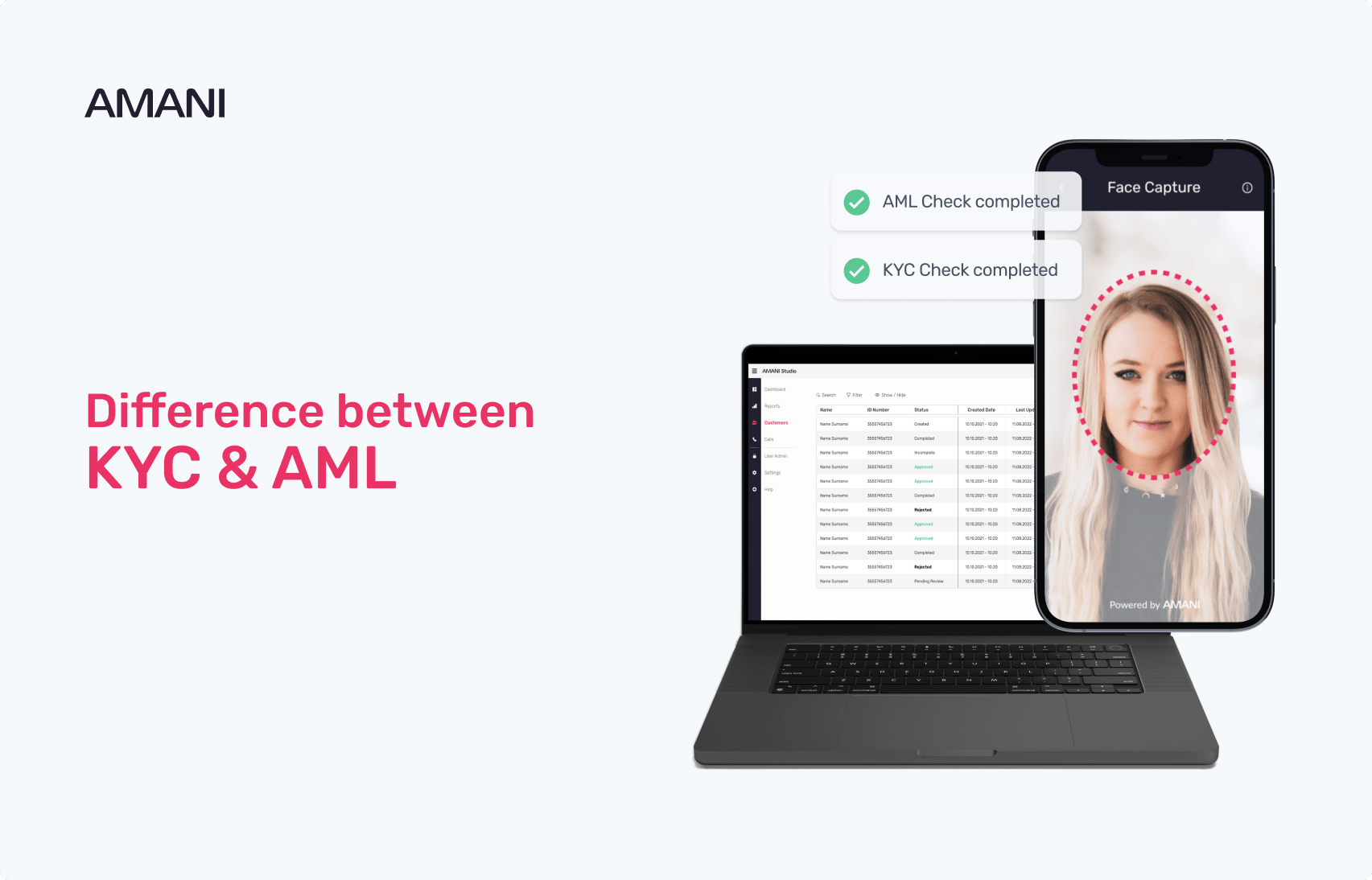Highlights
- What is KYC?
- The Importance of KYC
- What is AML?
- The Significance of AML
- Industries
- Recap of Differences
- Regulations
- How Amani Can Help?
Although KYC (Know Your Customer) and AML (Anti Money Laundering) seem to be two different issues, they cannot be used effectively without each other. In order for AML to be used correctly, KYC must be integrated seamlessly.
What is KYC?
KYC (Know your customer) is a fundamental process that financial institutions use to verify the identity of their clients. It involves gathering information about a customer’s identity and assessing the potential risks associated with their financial transactions. KYC acts as a preventative measure against identity theft, fraud, and money laundering.
The primary objectives of KYC:
- Confirming the customer’s identity
- Assessing the customer’s risk profile
- Monitoring transactions for suspicious activity
- Ensuring regulatory compliance
The Importance of KYC
Customer Relationship
KYC helps build trust between financial institutions and their customers by ensuring their safety and security. Thus, transactions in sectors such as banking and finance are both more practical and more secure, and this improves the customer experience.
Fraud Prevention
KYC acts as a barrier to fraudulent activities, protecting both the institution and its customers. It provides a safer experience by protecting customers and users on digital platforms.
Regulatory Compliance
Compliance with KYC regulations is essential to avoid legal and reputational risks.
What is AML?
AML (Anti-Money Laundering) refers to a set of regulations and practices aimed at preventing the illegal process of making “dirty” money appear legitimate.
The key objectives of AML
- Detecting and reporting suspicious activities
- Investigating and prosecuting money launderers
- Prevention of illegal flow of funds
The Importance of AML
Money Laundering Threats
AML prevents the financial sector from being used as a tool for money laundering.
Legal Obligations
Financial institutions must comply with AML regulations in order to maintain their licences and business activities.
Reputation Protection
Applying AML to your business enhances an organisation’s reputation and credibility.
The sectors and industries that are subject to AML (anti-money laundering) regulations in places such as Turkiye, UAE and the UK are listed below. These are sectors that are generally at risk of money laundering:
- Banks,
- Capital markets intermediary institutions
- Financial technology (FinTech) companies
- Insurance and retirement plan companies
- Factoring, financing and Financial leasing companies
- The General Directorate of the Post and Telegraph Organization (pertaining only to banking activities)
- Crypto money trading platforms and service providers
- Money exchange businesses and currency exchange offices
- Securities and Investment Firms
- Real Estate Sector
- Dealers of precious metals, gemstones, and luxury goods.
- Art galleries and auction houses for high-value artworks.
- Law firms and lawyers involved in financial transactions.
- Accounting firms and professionals providing financial services.
- Money Transmitters and Remittance Providers
- Import/Export Companies
- Charities and Non-Profit Organizations
- Casinos and Gaming Industry
- Law Enforcement and Regulatory Authorities
How do KYC & AML differ?
While the purpose of AML is broader, the purpose of KYC is more specific. KYC serves to verify the identity of a customer. It shows whether the potential customer says who they say they are or is a bad actor. AML, on the other hand, can help improve tax compliance in areas such as taxpayer transparency, detection of tax evasion, enforcement, and deterrence.
AML is typically structured around a set of regulations and practices that financial institutions must comply with. KYC has a simpler structure. It involves the collection of customer information such as name, address and identification documents, as well as the continuous monitoring of customer activities.
Regulations
AML related regulations in the UAE:
- Federal Decree No. 20 of 2018 on Anti-Money Laundering and Countering the Financing of Terrorism
- Cabinet Decision No (10) of 2019 concerning the Executive Regulations of Federal Decree Law No (20) of 2018 on Anti-Money Laundering and Combating the Financing of Terrorism and Illegal Organisations
AML related regulations in the UK:
- The Money Laundering, Terrorist Financing and Transfer of Funds (Information on the Payer) Regulations 2017
- The Financial Services and Markets Act 2000 ( FSMA )
- The Proceeds of Crime Act 2002
→ You can check gov.uk to understand the requirements of AML better.
AML related regulations in Turkiye:
- Law No. 5549 on the Prevention of Laundering Proceeds of Crime
- Turkish Penal Code (Law No. 5237)
- Banking Law (Law No. 5411)
- Law on the Regulation of Payment Services and Electronic Money Institutions (Law No. 6493)
- Capital Markets Law (Law No. 6362)
Amani offers you a reliable infrastructure with its 1377 document support. Also operating in 247 countries, Amani offers you 100% document extraction with 138 OCR languages.
Let us help your company stay compliant with AML/KYC regulations. Get in touch with us today.




